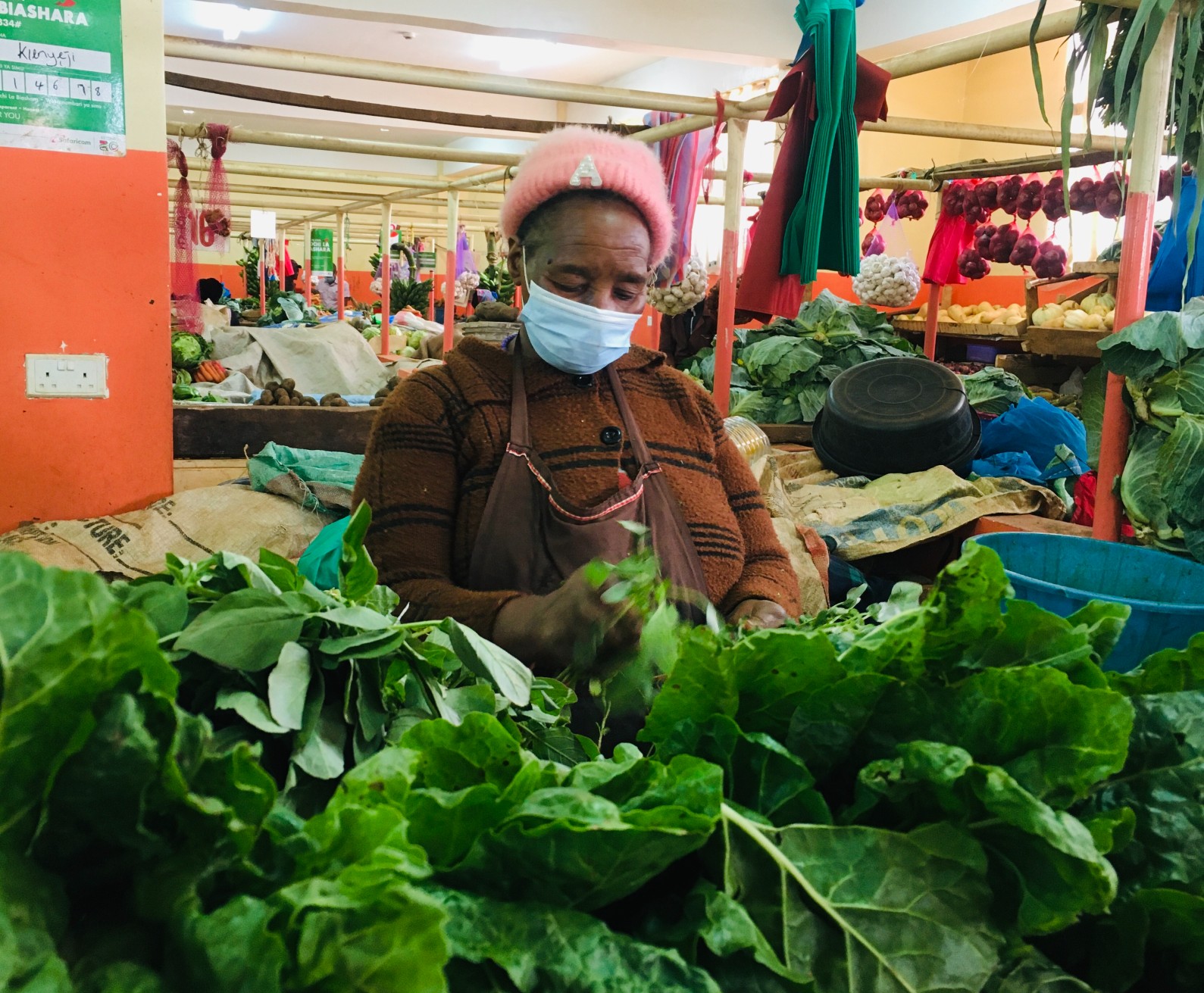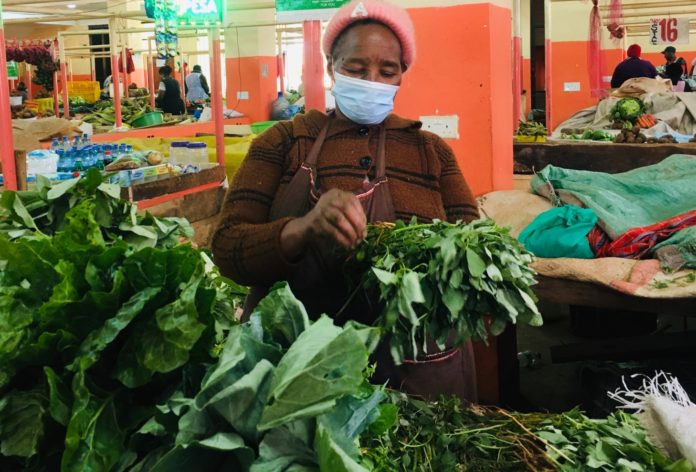By Florence Gichoya
Nairobi, Kenya: In the last seven years, vegetable vendor Lucy Wangari has sold vegetables at the Kikuyu Market, Kiambu County. She was a small-scale farmer in Gatundu, Kiambu County, but was frustrated by the low income. She decided to leave her farm and start trading vegetables. Her biggest motivation was to earn a living.
At first, she sold tomatoes, potatoes, carrots, and raw bananas, but she soon realized that those products were in low demand compared to green vegetables.
With Ksh 200 as start-up capital, Lucy bought her first stock and started selling spinach, cabbages, sukuma wiki (kales), terere (amaranth), kunde (cowpeas) and managu (African nightshade).
Her business was booming and she soon increased her daily stock. She would buy the vegetables directly from farmers and later sell them in retail in Kikuyu and Kawangware markets.
Wangari would buy kales at Ksh 500 and later sell at Ksh 1,500 after packaging them into smaller bundles. She also made daily supplies of kales worth Ksh 1,600 to a local supermarket and five restaurants based in Kikuyu town.
In every urban area in Kenya, there are vegetable vendors commonly known as ‘mama mboga’. These traders play a critical role in the sustenance of food systems with minimal government support.
They function in the informal sector and thrive on the availability of affordable food products from rural areas and customers living in towns and cities. Kenya, like other developing countries, has a growing urban population that is dependent on a fragile food system to feed its population.
According to the Transforming Food Systems for Rural Prosperity – 2021 report by the International Fund for Agricultural Development (IFAD), food system small and medium enterprises account for 25 percent of rural employment and 21 percent employment in the cities. The survey was conducted in 13 countries from Africa, Asia, and Latin America.
Food systems indicate the process of food production from the farm, processing, distribution to consumption.

The COVID-19 Disruption
However, this changed when the COVID-19 pandemic hit the country in March 2020. The government issued stringent containment measures in order to curb the spread of the virus.
Wangari lost many clients including the restaurants and supermarkets, which immediately canceled her daily orders because their businesses were negatively affected by the pandemic. She was distraught by the turn of events.
“My business was doing well until the pandemic hit the country, all of a sudden the customers were no longer flocking the market in large numbers, and the restaurants where I supplied vegetables suddenly shut down. It was a nightmare,” she said.
In 2020, the Kenyan government and UN Women conducted a survey and examined the socio-economic effects of COVID-19 on the livelihoods of men and women in Kenya. The report dubbed COVID-19 Gender Assessment showed 76 percent of women saw a decrease in their income since the onset of the pandemic. In addition, about 45 percent of households reported a significant decline in food availability in the shops and markets.
Surviving the pandemic
Wangari struggled to get through the pandemic. Many customers avoided going to the markets in order to avoid crowded spaces.
“Customers avoided coming to the market. They preferred to buy vegetables from the supermarkets because they feared catching the virus in the market,” she said.
Wangari was unable to pay her house rent and was constantly worried about contracting the disease since she did not have medical cover. Her business incurred huge losses and she used her savings to pay her bills.
She would buy stock worth Ksh 200 and get very few customers. Eventually, her perishable vegetables would get spoiled because of the lack of cold storage facilities in the market.
Today, Wangari’s business is recovering slowly. The quantity of stock she would sell in one day prior to the pandemic, now takes her three days to clear the same amount of stock. She affirms that the pandemic negatively affected many women entrepreneurs in the food systems sector.
While the government and the private sector’s support for women-owned businesses has increased in the formal sector, the same effort has not been applied to women entrepreneurs in the informal sector. In 2020, the African Union launched the Decade of Women’s Financial and Economic Inclusion (2020-2030) with the goal to empower African women from different sectors economically.
According to United Nations Conference on Trade and Development (UNCTAD), the Micro Small and Medium Enterprises (MSMEs) account for about two-thirds of the employees worldwide and contribute to about 80 to 90 percent of employment in developing countries.
The informal sector is a major contributor to the economic growth in the country and women are key players in the food system processes. Lucy hopes that the government will set up a fund with flexible requirements and help women traders in the informal sector across the country.














